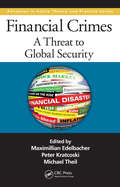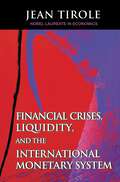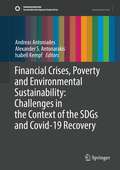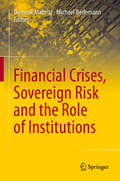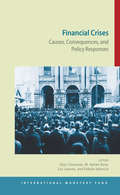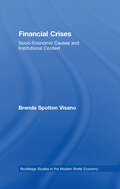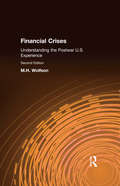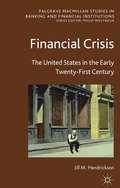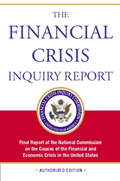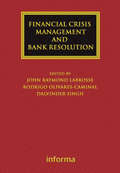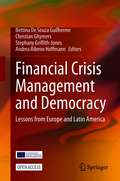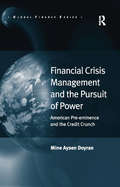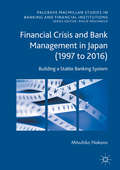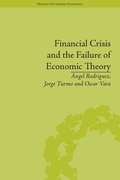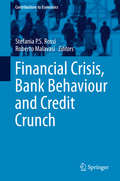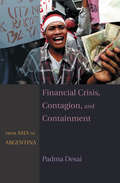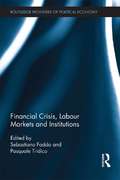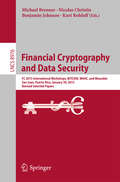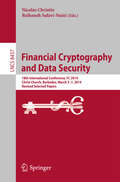- Table View
- List View
Financial Crimes: A Threat to Global Security (Advances in Police Theory and Practice)
by Peter Kratcoski Michael Theil Maximillian EdelbacherFinancial market reform has focused chiefly on the threats to stability arising from the risky, uncontrolled activity of the leaders of financial institutions. Nevertheless, organized crime, white-collar crime, and corruption have a huge impact on financial systems worldwide and must also be confronted if true reform is to be achieved. A collection
Financial Crises and the Nature of Capitalist Money: Mutual Developments from the Work of Geoffrey Ingham
by Jocelyn Pixley G. C. HarcourtThis volume is a debate about a sociology and economics of money: a form of positive trespassing. It is unique in being written by scholars of both disciplines committed to this mutual venture and in starting from the original groundwork laid by Geoffrey Ingham. The contributors look critically at money's institutions and the meanings and history of money-creation and show the cross cutting purposes or incommensurable sides of money and its crises. These arise from severe tensions and social conflicts about the production of money and its many purposes. We demonstrate the centrality of money to capitalism and consider social disorders since the 2007 crisis, which marks the timeliness and need for dialogue. Both disciplines have far too much to offer to remain in the former, damaging standoff. While we are thankful to see a possible diminution of this split, remnants are maintained by mainstream economic and sociological theorists who, after all the crises of the past 30 years, and many before, still hold to an argument that money really does not 'matter'. We suggest, to many different and interested audiences, that since money is a promise, understanding this social relation must be a joint though plural task between economics and sociology at the very least.
Financial Crises and the Politics of Macroeconomic Adjustments
by Stefanie WalterWhen are policy makers willing to make costly adjustments to their macroeconomic policies to mitigate balance-of-payments problems? Which types of adjustment strategies do they choose? Under what circumstances do they delay reform, and when are such delays likely to result in financial crises? To answer these questions, this book examines how macroeconomic policy adjustments affect individual voters in financially open economies and argues that the anticipation of these distributional effects influences policy makers' decisions about the timing and the type of reform. Empirically, the book combines analyses of cross-national survey data of voters' and firms' policy evaluations with comparative case studies of national policy responses to the Asian Financial Crisis of 1997/8 and the recent Global Financial Crisis in Eastern Europe. The book shows that variation in policy makers' willingness to implement reform can be traced back to differences in the vulnerability profiles of their countries' electorates.
Financial Crises, Liquidity, and the International Monetary System
by Jean TiroleOnce upon a time, economists saw capital account liberalization--the free and unrestricted flow of capital in and out of countries--as unambiguously good. Good for debtor states, good for the world economy. No longer. Spectacular banking and currency crises in recent decades have shattered the consensus. In this remarkably clear and pithy volume, one of Europe's leading economists examines these crises, the reforms being undertaken to prevent them, and how global financial institutions might be restructured to this end. Jean Tirole first analyzes the current views on the crises and on the reform of the international financial architecture. Reform proposals often treat the symptoms rather than the fundamentals, he argues, and sometimes fail to reconcile the objectives of setting effective financing conditions while ensuring that a country "owns" its reform program. A proper identification of market failures is essential to reformulating the mission of an institution such as the IMF, he emphasizes. Next he adapts the basic principles of corporate governance, liquidity provision, and risk management of corporations to the particulars of country borrowing. Building on a "dual- and common-agency perspective," he revisits commonly advocated policies and considers how multilateral organizations can help debtor countries reap enhanced benefits while liberalizing their capital accounts. Based on the Paolo Baffi Lecture the author delivered at the Bank of Italy, this refreshingly accessible book is teeming with rich insights that researchers, policymakers, and students at all levels will find indispensable.
Financial Crises, Poverty and Environmental Sustainability: Challenges in the Context of the SDGs and Covid-19 Recovery (Sustainable Development Goals Series)
by Andreas Antoniades Alexander S. Antonarakis Isabell KempfThis volume advances the state-of-the-art in the study of the interplay among financial crises, poverty dynamics and environmental sustainability. It offers timely and unique contributions to the immediate global challenge of sustainable development. Developing a new evidence-base, the volume offers concrete recommendations for policy action needed in advancing the Sustainable Development Goals (SDGs) in relation to environment and poverty during the current conditions of financial distress. The approach taken is inductive and evidence-driven. Most analysis is based on in-depth case studies that aim to offer a detailed and dynamic picture on how poverty and environmental sustainability interact in specific social contexts and financial crises. In this way the volume aims to generate a wealth of new and concrete evidence that offer a solid foundation to understand the multiple channels through which social and environmental factors interact, and the ways in which this interaction can and should be managed in order to achieve the needed global transition to sustainability. Broader dynamics that are covered and analysed include the historical legacies of structural adjustment and colonialism; the current debt wave experienced in developing countries; the role of inequality; the significant impact that climate change has on livelihoods and on meeting the SDGs; the new challenge presented by the Covid-19 pandemic for the SDGs; the challenge of sustainable funding for SDGs; and the need for a new eco-social contract. Case-studies examined include Cambodia, Ethiopia, India, Indonesia, Zambia, and subregions such as the Caribbean, sub-Saharan Africa and Lower Mekong Countries. The volume is part of a joint initiative by the ‘Sussex Sustainability Research Programme (SSRP)’ of the University of Sussex, the ‘UNDP-UNEP Poverty-Environment Action for Sustainable Development Goals’ and the ‘United Nations Research Institute for Social Development (UNRISD)’. The overall aim is to advance a new research programme and foster a better understanding of the multiple, complex and often opposing ways through which the punctuated economic slowdown of financial crises, poverty dynamics and environmental sustainability interact. It also makes novel recommendations into how poverty reduction and environment can work in synergy rather than being antagonistic, especially during financial distress, leading into recommendations directly geared towards achieving the SDGs and beyond.
Financial Crises, Sovereign Risk and the Role of Institutions
by Dominik Maltritz Michael BerlemannThe recent world economic crisis showed very clearly that financial crises and sovereign defaults are severe threats to economic and social prosperity. In addition, it became apparent that currency crises and banking crises often occur together and are closely related to sovereign debt crises and defaults. The present book contains new research on various important issues related to financial crises and sovereign default risk by leading experts in the field. The book discusses new modelling approaches to financial crises, defaults and their interdependencies. It also sheds light on the consequences of different sorts of crises for the trust in the institutions which are concerned with managing them. Moreover, it provides discussions of several institutional features of the EMU and the world financial system and in particular the risks inherent in these institutions. The book also includes interesting suggestions for solving crises and improving financial stability.
Financial Crises: Causes, Consequences, and Policy Responses
by M. Ayhan Kose Stijn Claessens Luc Laeven Fabián ValenciaA report from the International Monetary Fund.
Financial Crises: Socio-Economic Causes and Institutional Context (Routledge Studies in the Modern World Economy)
by Brenda Spotton VisanoThis study explores the major patterns of change in the evolution of financial crises as enduring phenomena and analyzes the paradoxical position that crises are at once similar to and different from each other. Brenda Spotton-Visano examines economic, psychological and social elements intrinsic to the process of capitalist accumulation and innovation to explain the enduring similarities of crises across historical episodes. She also assesses the impact that changing financial and economic structures have on determining the specific nature of crises and the differential effect these have in focal point, manner and extent of transmission to other, otherwise unrelated, parts of the economy. Financial Crises offers a consistent method for interpreting variations in financial crises through time and allows for a better overall appreciation for both the transitory fragility and enduring flexibility of financial capitalism and the potential vulnerability created by on-going financial development. Topical and informative, this key book is of keen interest to all those studying and researching international economics and political economy.
Financial Crises: Understanding the Postwar U.S. Experience
by M.H. WolfsonThis book is a survey and critique of the major theories of financial crises. The first edition built a model of crisis from an analysis of postwar financial crises in the US through the mid-1980s. The second edition continues the story from 1985 and covers the stock market crash of 1987, the collapse of the Savings and Loan industry, the severe problems of US commercial banks, and the increasing risks posed by junk bonds. A new chapter analyses the causes of increasing financial instability in the 1980s. The book's extensive charts and tables are fully revised and updated to present the latest evidence. The first edition has gained wide interest as a supplemental text.
Financial Crisis
by Jill M. HendricksonThe 2007-2009 financial crisis caught many by surprise. When the dust began to settle, people began looking around and asking how this could have happened and why we did not see it coming. Criticism fell heavily on the economics profession because there was a feeling that the models and theories of economics had failed to properly warn and prepare us for a significant crisis. This book carefully analyses existing theories of financial crisis to determine if they are still appropriate for understanding modern financial crises. This is an important endeavour because financial crisis theory has largely been ignored for many years. Indeed, it has been almost twenty years since economists have seriously reconsidered financial crisis theory. This book fills that gap and offers insight into the current debate regarding the efficacy of economic models and theories relevant to understanding financial distress.
Financial Crisis Inquiry Report: Final Report of the National Commission on the Causes of the Financial and Economic Crisis in the Un
by Financial Crisis Inquiry CommissionOfficial Government Edition The definitive report on what caused America's economic meltdownOCo and who was responsibleThe financial and economic crisis has touched the lives of millions of Americans who have lost their jobs and their homes, but many have little understanding of how it happened. Now, in this very accessible report, readers can get the facts. Formed in May 2009, the Financial Crisis Inquiry Commission (FCIC) is a panel of 10 commissioners with experience in business, regulations, economics, and housing, chosen by Congress to explain what happened and why it happened. This panel has had subpoena power that enabled them to interview people and examine documents that no reporter had access to. The FCIC has reviewed millions of pages of documents, and interviewed more than 600 leaders, experts, and participants in the financial markets and government regulatory agencies, as well as individuals and businesses affected by the crisis. In the tradition of The 9/11 Commission Report, "The Financial Crisis Inquiry Report" will be a comprehensive book for the lay reader, complete with a glossary, charts, and easy-to-read diagrams, and a timeline that includes important events. It will be read by policy makers, corporate executives, regulators, government agencies, and the American people.
Financial Crisis Management and Bank Resolution
by Dalvinder Singh John Raymond LaBrosse Rodrigo Olivares-CaminalFinancial Crisis Management and Bank Resolution provides an analysis of the responses to the recent crisis that has beset the international financial markets taking a top down approach looking at the mechanisms to manage a financial crisis, to the practicalities of dealing with the resolution of a bank experiencing distress. This work is an interdisciplinary analysis of the law and policy surrounding crisis management and bank resolution. It comprises contributions from a team of leading experts in the field that have been carefully selected from across the globe. These experts are drawn from the law, central banks, government, financial services and academia. This edited collection will provide a new and important contribution to the subject at a crucial time in the debate around banking resolution and crisis management regimes, and help to plug the gap in our knowledge and understanding of the law of bank resolution and restructuring.
Financial Crisis Management and Democracy: Lessons from Europe and Latin America
by Stephany Griffith-Jones Andrea Ribeiro Hoffmann Bettina De Souza Guilherme Christian GhymersThis open access book discusses financial crisis management and policy in Europe and Latin America, with a special focus on equity and democracy. Based on a three-year research project by the Jean Monnet Network, this volume takes an interdisciplinary, comparative approach, analyzing both the role and impact of the EU and regional organizations in Latin America on crisis management as well as the consequences of crisis on the process of European integration and on Latin America’s regionalism.The book begins with a theoretical introduction, exploring the effects of the paradigm change on economic policies in Europe and in Latin America and analyzing key systemic aspects of the unsustainability of the present economic system explaining the global crises and their interconnections. The following chapters are divided into sections. The second section explores aspects of regional governance and how the economic and financial crises were managed on a macro level in Europe and Latin America. The third and fourth sections use case studies to drill down to the impact of the crises at the national and regional levels, including the emergence of political polarization and rise in populism in both areas. The last section presents proposals for reform, including the transition from finance capitalism to a sustainable real capitalism in both regions and at the inter-regional level of EU-LAC relations.Written by an international network of academics, practitioners and policy advisors, this volume will be of interest to researchers and students interested in macroeconomics, comparative regionalism, democracy, and financial crisis management as well as politicians, policy advisors, and members of national and regional organizations in the EU and Latin America.
Financial Crisis Management and the Pursuit of Power: American Pre-eminence and the Credit Crunch (Global Finance)
by Mine Aysen DoyranHow does America manage crisis on behalf of international finance in the absence of a global state? Doyran explores the relationship between state power and global finance and in particular examines the various attempts by the US state at financial crisis management. The case studies highlight the dramatic consequences of the rise of financial capitalism in the US economy, and also explore regulatory sources of market failures, systemic risk and moral hazard. This book focuses on this primary issue facing scholars of American power in various social science disciplines, including political science, finance and international relations, professional financial analysts and Government officials. This book is for the critical reader who is interested in financial policy and wants to learn more about the causes and consequences of the rise of financial markets.
Financial Crisis and Bank Management in Japan (1997 to #2016)
by Mitsuhiko NakanoThis book explores the challenges faced by the Japanese economy and the Japanese banking industry following the financial crisis that emerged around the turn of the last millennium. The author explores how the Japanese financial crisis of the late 1990s engendered huge restructuring efforts in the banking industry, which eventually led to even more sweeping changes of the economic system and long-term deflation in the 2000s. The discussion begins with an overview of the unconventional monetary policy launched by the Bank of Japan at this time, while banking administrative policies maintained their strict code of governance. The author describes how, just as recovery seemed possible, the twin disasters of the Lehman shock and the Great East Japan Earthquake buffeted the recovering economy, and pushed Japan again into deflation. The book also looks to the very recent past, with the sudden advent of Abenomics in 2013, with its three-pronged approach, which was intended to break the deflationary mindset. Finally, the author projects what the future of the banking industry in Japan might encompass, as looming demographic changes gradually threaten both the economy and the banking industry.
Financial Crisis and Bank Management in Japan: Building a Stable Banking System (Palgrave Macmillan Studies in Banking and Financial Institutions)
by Mitsuhiko NakanoThis book explores the challenges faced by the Japanese economy and the Japanese banking industry following the financial crisis that emerged around the turn of the last millennium. The author explores how the Japanese financial crisis of the late 1990s engendered huge restructuring efforts in the banking industry, which eventually led to even more sweeping changes of the economic system and long-term deflation in the 2000s. The discussion begins with an overview of the unconventional monetary policy launched by the Bank of Japan at this time, while banking administrative policies maintained their strict code of governance. The author describes how, just as recovery seemed possible, the twin disasters of the Lehman shock and the Great East Japan Earthquake buffeted the recovering economy, and pushed Japan again into deflation. The book also looks to the very recent past, with the sudden advent of Abenomics in 2013, with its three-pronged approach, which was intended to break the deflationary mindset. Finally, the author projects what the future of the banking industry in Japan might encompass, as looming demographic changes gradually threaten both the economy and the banking industry.
Financial Crisis and Institutional Change in East Asia
by Jikon LaiIn light of the Asian financial crisis of 1997, Lai examines whether East Asian economies converged onto the liberal market model by studying the evolution of the financial sectors of Korea, Malaysia and Thailand. This includes sectoral diversification, the nature of competition, and the regulatory and supervisory frameworks.
Financial Crisis and the Failure of Economic Theory (Modern Heterodox Economics #2)
by Jorge Turmo ArnalFirst Published in 2016. Routledge is an imprint of Taylor & Francis, an Informa company.
Financial Crisis in Asia: 1997-1998 (Abridged)
by Jonathan Schlefer Rafael Di Tella Huw PillWhat caused the 1997-98 Asia Crisis: Asian nations' poor economic management, international financial contagion, close "crony" relations between local politicians and capitalists? This case examines how the crisis erupted in Thailand and spread in a chain of events that no one-neither Asian financial authorities nor Western economists-had foreseen. The crisis raises questions about how competently financial institutions such as mutual funds managed their global capital investments. It raises questions about how effective the International Monetary Fund's package of reforms was-and to what extent the IMF acted in the interest of Wall Street rather than developing nations. And the crisis raises questions about the development policies of Asian nations: Did too-close "crony" relations between politicians and owners of major banks or firms pave the way for crisis?
Financial Crisis, Bank Behaviour and Credit Crunch
by Stefania P.S. Rossi Roberto MalavasiThis book explores some relevant distortions and market failures in financial and banking markets caused by the recent financial crisis and offers important insights to policymakers as well. After having introduced the reader to the economic background behind the origin of the present financial turmoil, the book proposes a distinct angle to look at some macro and microeconomic aspects. The volume discusses whether and to what extent policies, implemented by governments and monetary authorities to countervail bank defaults and avoid a disastrous financial instability, have in some way determined opportunistic conducts (moral hazard), changes in banks' behaviour, distortive incentives and market failures. Furthermore, the book offers a viewpoint on the effects of the evolution of regulation for the banking sector. Finally, the book assesses how the increase in the cost of funding and the shrinking in credit supply (credit crunch) has modified the financial structure of small and medium firms. To illustrate this, some specific cases at Italian regional level are examined.
Financial Crisis, Contagion, and Containment: From Asia to Argentina
by Padma DesaiThis book provides a sweeping, up-to-date, and boldly critical account of the financial crises that rocked East Asia and other parts of the world beginning with the collapse of the Thai baht in 1997. Retracing the story of Asia's "Crisis Five"--Indonesia, Malaysia, South Korea, the Philippines, and Thailand--Padma Desai argues that the region's imprudently fast-paced opening to the free flow of capital was pushed by determined advocates, official and private, in the global economy's U.S.-led developed center. Turmoil ensued in these peripheral economies, the Russian ruble faltered, and Brazil was eventually hit. The inequitable center-periphery relationship also extended to the policy measures that the crisis-swept economies implemented under International Monetary Fund bailouts, which intensified the downturns induced by the panic-driven outflows of short-term capital. Financial Crisis, Contagion, and Containment examines crisis origin and resolution in a comparative perspective by combing empirical evidence from the most robust economies to the least. Why is the U.S. relatively successful at weathering economic ups and downs? Why is Japan stuck in policy paralysis? Why is the European Central Bank unable to achieve both inflation control and stable growth? How can emerging markets avoid turbulence amid free-flowing speculative capital from private lenders of the developed center? Engaging and nontechnical yet deeply insightful, this book appears at a time when the continuing turmoil in Argentina has revived policy debates for avoiding and addressing financial crises in emerging market economies.
Financial Crisis, Corporate Governance, and Bank Capital
by Sanjai BhagatIn the aftermath of the 2007-8 crisis, senior policymakers and the media have blamed excessive risk-taking undertaken by bank executives, in response to their compensation incentives, for the crisis. The inevitable follow-up to this was to introduce stronger financial regulation, in the hope that better and more ethical behaviour can be induced. Despite the honourable intentions of regulation, such as the Dodd-Frank Act of 2010, it is clear that many big banks are still deemed too big to fail. This book argues that by restructuring executive incentive programmes to include only restricted stock and restricted stock options with very long vesting periods, and financing banks with considerably more equity, the potential of future financial crises can be minimized. It will be of great value to corporate executives, corporate board members, institutional investors and economic policymakers, as well as graduate and undergraduate students studying finance, economics and law.
Financial Crisis, Labour Markets and Institutions (Routledge Frontiers of Political Economy #170)
by Pasquale Tridico Sebastiano FaddaThis book seeks to explain the global financial crisis and its wider economic, political, and social repercussions, arguing that the 2007-9 meltdown was in fact a systemic crisis of the capitalist system. The volume makes these points through the exploration of several key questions: What kind of institutional political economy is appropriate to explain crisis periods and failures of crisis-management? Are different varieties of capitalism more or less crisis-prone, and can the global financial crisis can be attributed to one variety more than others? What is the interaction between the labour market and the financialization process? The book argues that each variety of capitalism has its own specific crisis tendencies, and that the uneven global character of the crisis is related to the current forms of integration of the world market. More specifically, the 2007-09 economic crisis is rooted in the uneven income distribution and inequality caused by the current financial-led model of growth. The book explains how the introduction of more flexibility in the labour markets and financial deregulation affected everything from wages to job security to trade union influence. Uneven income distribution and inequality weakened aggregate demand and brought about structural deficiencies in aggregate demand and supply. It is argued that the process of financialization has profoundly changed how capitalist economies operate. The volume posits that financial globalization has given rise to growing international imbalances, which have allowed two growth models to emerge: a debt-led consumption growth model and an export-led growth model. Both should be understood as reactions to the lack of effective demand due to the polarization of income distribution.
Financial Cryptography and Data Security
by Michael Brenner Nicolas Christin Benjamin Johnson Kurt RohloffThis book constitutes the refereed proceedings of three workshops held at the 19th International Conference on Financial Cryptography and Data Security, FC 2015, in San Juan, Puerto Rico, in January 2015. The 22 full papers presented were carefully reviewed and selected from 39 submissions. They feature the outcome of the Second Workshop on Bitcoin Research, BITCOIN 2015, the Third Workshop on Encrypted Computing and Applied Homomorphic Cryptography, WAHC 2015, and the First Workshop on Wearable Security and Privacy, Wearable 2015.
Financial Cryptography and Data Security
by Nicolas Christin Reihaneh Safavi-NainiThis book constitutes the thoroughly refereed post-conference proceedings of the 18th International Conference on Financial Cryptography and Data Security (FC 2014), held in Christ Church, Barbados, in March 2014. The 19 revised full papers and 12 short papers were carefully selected and reviewed from 165 abstract registrations and 138 full papers submissions. The papers are grouped in the following topical sections: payment systems, case studies, cloud and virtualization, elliptic curve cryptography, privacy-preserving systems, authentication and visual encryption, network security, mobile system security, incentives, game theory and risk, and bitcoin anonymity.
